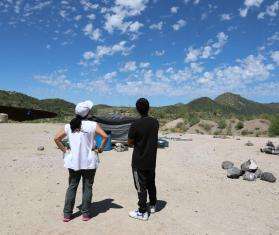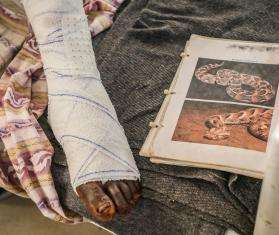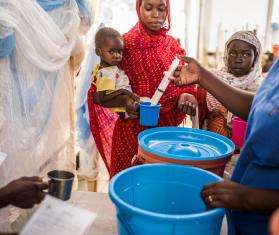Kiambu is one of the counties in Kenya with the highest number of people who use drugs, specifically heroin, but for years there was no existing medical facility providing care for these patients and only a few accessed services in Nairobi, over one hour away from most.
In 2019, Doctors Without Borders/Médecins Sans Frontières (MSF) began a holistic program in prisons and local communities for people who use drugs. This year, after five years of providing care in medically assisted therapy treatment facilities in Kiambu, MSF has handed over its clinics to Kenya’s Department of Health and Kenya Prison Services—marking a major milestone in the treatment of people who use drugs in the county.

Harm reduction and holistic care
Medically assisted therapy services are offered to reduce addiction to opioids like heroin, as well as related health risks and deaths, and to improve the lives of people who use drugs. The clinics provide methadone and buprenorphine in liquid and tablet forms, respectively, as opioid substitution therapy, a component of harm reduction.
“The harm reduction approach aims at reducing negative health, social, legal, and financial consequences of drug addiction,” explained Dr. Edi Atte, MSF country director in Kenya. “The medically assisted therapy clinics [take] a one-stop medical facilities approach, with a holistic approach to treatment beyond opioid substitution. This includes the prevention of infections and transmission of HIV and viral hepatitis which are caused by using unsterile needles; prevention and treatment of tuberculosis (TB); mental health and psychosocial support; and support for re-integration with family and community.”

Patient-centered care for people who use drugs
Patient-centered approaches and innovations such as take-home doses, deliveries to prisons for incarcerated patients, decentralization of care, and satellite dispensing sites increase access to medically assisted therapy services—and the chance of recovery for people who use drugs. Access to care and proximity to health care facilities are key to securing health care for these patients.
MSF has made significant contributions by establishing clinics closer to patients’ homes to enhance adherence to treatment, including in prisons and satellite dispensing sites in primary health care facilities. Patients unable to access their daily methadone dose due to illness, injuries, school, or other reasons receive daily home or hospital deliveries through peer educators. To enhance social reintegration and economic self-reliance, two weeks of dosage—packaged and locked in a safe box for keeping at home—are provided to patients who are unable to make it daily to the facilities and are already stable, working or attending school, and have solid support networks for their recovery journey.
Beyond medical care, social reintegration and support for patients remains a critical factor in enhancing recovery and reducing stigma, as social and economic support reduces the chances of relapse. Community support and acceptance, including among health care workers, play an important role in patients’ recovery journey and adherence to treatment.

A milestone conclusion
Since September 2019, 1,619 people have benefitted from this holistic program, and 556 people are currently receiving care in the clinics. Two other clinics are run in partnership with Kenya Prisons Services in Ruiru Prisons Staff Training College Health Center and Thika GK Prison, serving both incarcerated patients and patients in the communities. Services were run in partnership with the County Government of Kiambu, Kenya Prisons Services, the National AIDS and STI’s Control Program, and LVCT Health.
This milestone handover was made possible due to the training of health care workers, and a commitment by the County Department of Health Services and Kenya Prisons Services to provide services for people who use drugs.
“We have health care workers who now have the knowledge on patient care and management of the clinic,” said Dr. Elius Maina, a member of the county executive committee of the Department of Health Services. “We acknowledge that medically assisted therapy services are still crucial for patients from Kiambu, and for that reason, we will continue with these services even after MSF exits.”
In photos: Care for people with addiction in Kenya









